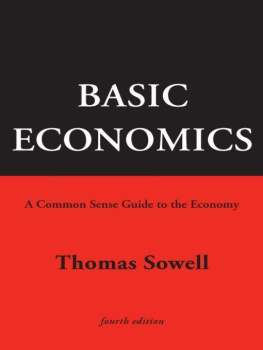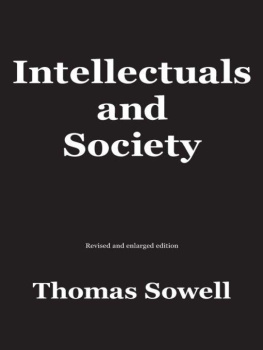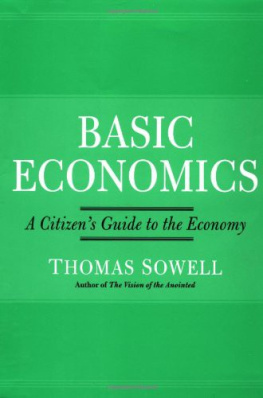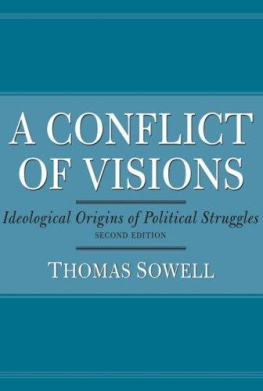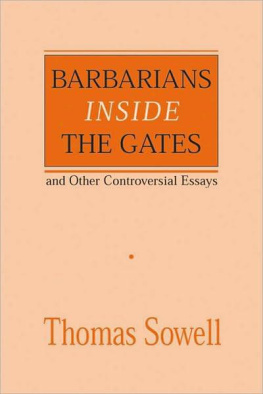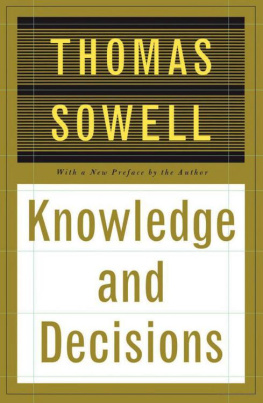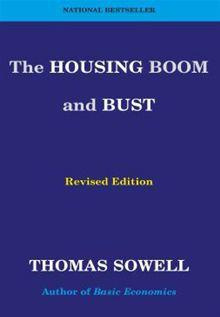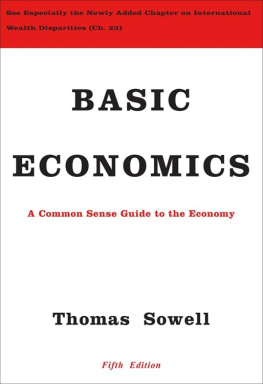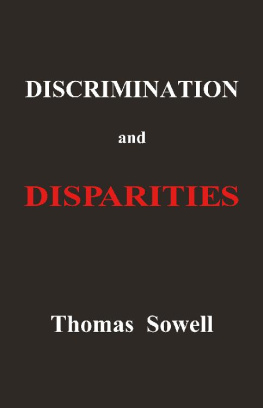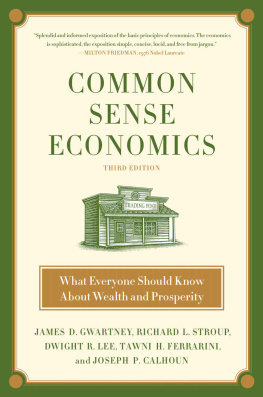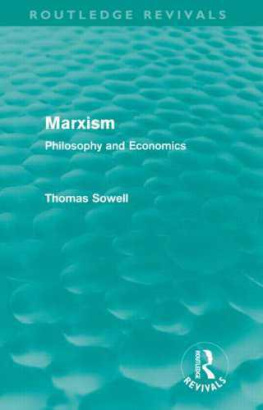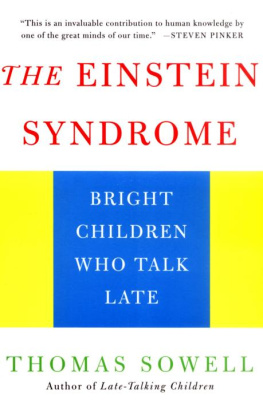Table of Contents
A few lines of reasoning can change the way we see the world.
Steven E. Landsburg
PREFACE
This is a book for the general public or for beginning students in economics. Just as many people do, this book has put on weight with the passing years, as new chapters have been added and existing chapters expanded for clarification and updated to stay abreast of changing developments in economies around the world. This edition has a new chapter on the history of the development of economics itself and the issues raised by that history. It also has added an extensive section on the economics of corporations in the chapter on big business and government, as well as other new material in other chapters.
Readers continuing interest in these new editions at home, and a growing number of translations into foreign languages overseas, suggest that there is a widespread desire for readable information on economics, as distinguished from the jargon, graphs, and equations that are all too common in many writings on the subject. Through its various editions, the fundamental idea behind Basic Economics remains the same: Learning economics should be as uncomplicated as it is informative.
Most of us are necessarily ignorant of many complex fields, from botany to brain surgery. As a result, we simply do not attempt to operate in, or comment on, those fields. However, every voter and every politician that they vote for affects economic policies. We cannot opt out of economic issues and decisions. Our only options are to be informed, uninformed, or misinformed, when making our choices. Basic Economics is intended to make it easier to be informed. The fundamental principles of economics are not hard to understand but they are easy to forget, especially amid the heady rhetoric of politics and the media. The vivid real-life examples used throughout this book make these principles indelible, in a way that graphs and equations might not.
In keeping with the nature of Basic Economics as an introduction to economics for the general public, the usual footnotes or end-notes are left out. However, those who wish to check up on some of the surprising facts they will learn about here can find the sources at the end of this e-book. For instructors who are using Basic Economics as a textbook in their courses, or for parents who are homeschooling their children, more than a hundred questions are also available in the back section, with pages listed after each question, showing where the answer to that question can be found in the text. My e-mail address is economics@tsowell.com.
Whether you are reading Basic Economics for a course or just for your own understanding of the economy, it has been written with the thought that this should be a relaxed experience as well as an eye-opening one.
THOMAS SOWELL
Hoover Institution
Stanford University
ACKNOWLEDGMENTS
Like other books of mine, this one owes much to my two extraordinary research assistants, Na Liu and Elizabeth Costa. In addition to their tracking down all sorts of information for me, Ms. Costa did the copy-editing and fact-checking of the manuscript, which Ms. Liu then converted into galleys and helped to index, after which the resulting Quark file was sent to the publisher, who could have the book printed directly from her computer file. The new chapter on the history of economics was read by distinguished emeritus Professor William R. Allen of UCLA, a former colleague whose insightful comments and suggestions were very much appreciated, even when I did not make full use of all of them. Needless to say, any errors or shortcomings that remain after all these peoples efforts can only be my responsibility.
And of course none of this would be possible without the support of the Hoover Institution and the research facilities of Stanford University.
Chapter 1
WHAT IS ECONOMICS?
Whether one is a conservative or a radical, a protectionist or a free trader, a cosmopolitan or a nationalist, a churchman or a heathen, it is useful to know the causes and consequences of economic phenomena.
George J. Stigler
Understanding most of the economic issues discussed in the media and in politics requires knowledge of only the most basic principles of economicsand yet these principles are unknown to most of the public, and are widely ignored by politicians and journalists, and even by many scholars outside the field of economics.
Principles of economics apply around the world and have applied over thousands of years of recorded history. They apply in many very different kinds of economiescapitalist, socialist, feudal, or whateverand among a wide variety of peoples, cultures, and governments. Policies which led to rising price levels under Alexander the Great have led to rising price levels in America, thousands of years later. Rent control laws have led to a very similar set of consequences in Cairo, Hong Kong, Stockholm, Melbourne, and New York. So have similar agricultural policies in India and in the European Union countries.
Differences in economic practices from one country to another are also revealing. There were economic reasons why manufacturing enterprises in the days of the Soviet Union kept almost enough inventory on hand to last a year, while inventories of supplies in some Japanese companies like Toyota are only enough to last a matter of hours, with new parts and equipment arriving at the factory at various times during the day, to be unloaded from trucks and installed immediately on cars as they are being assembled. Both of these very different inventory policies had a rational basis, given the very different kinds of economic systems in which they existed.
Economics is more than just a way to see patterns or to unravel puzzling anomalies. Its fundamental concern is with the material standard of living of society as a whole and how that is affected by particular decisions made by individuals and institutions. One of the ways of doing this is to look at economic policies and economic systems in terms of the incentives they create, rather than simply the goals they pursue. This means that consequences matter more than intentionsand not just the immediate consequences, but also the longer run repercussions of decisions, policies, and institutions.
Nothing is easier than to have good intentions but, without an understanding of how an economy works, good intentions can lead to disastrous consequences for a whole nation. Many, if not most, economic disasters have been a result of policies intended to be beneficialand these disasters could often have been prevented if those who originated and supported such policies had understood economics.
Many people agree on the importance of economics, but there is much less agreement on just what economics is. Among the misconceptions of economics is that it is something that tells you how to make money or run a business or predict the ups and downs of the stock market. But economics is not personal finance or business administration, and predicting the ups and downs of the stock market has yet to be reduced to a dependable formula.
To know what economics is, we must first know what an economy is. Perhaps most of us think of an economy as a system for the production and distribution of the goods and services we use in everyday life. That is true as far as it goes, but it does not go far enough. The Garden of Eden was a system for the production and distribution of goods and services, but it was not an economy, because everything was available in unlimited abundance. Without scarcity, there is no need to economizeand therefore no economics. A distinguished British economist named Lionel Robbins gave the classic definition of economics:



